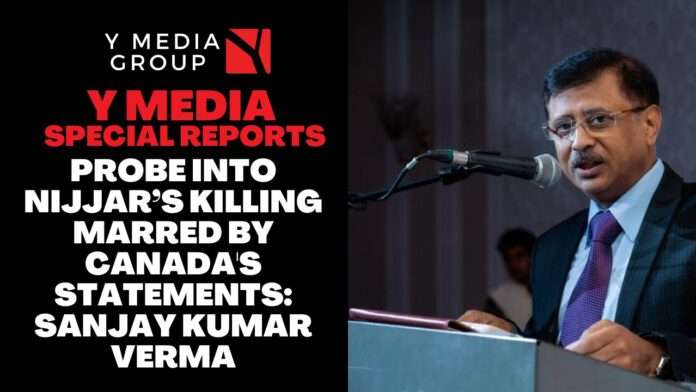India has accused Canada of already tainting investigation into the killing of pro-Khalistan leader Hardeep Singh Nijjar, a designated terrorist in New Delhi, by dragging its name into it without producing any evidence.
“Where is the evidence? Where is the conclusion of the investigation? I would go a step further and say now the investigation has already been tainted. A direction has come from someone at a high level to say India or Indian agents are behind it,” Indian High Commissioner to Canada Sanjay Kumar Verma told the Globe and Mail newspaper in an interview published on Saturday.
India-Canada relations have deteriorated after Canadian Prime Minister Justin Trudeau, in a statement in parliament on September 18, accused India of involvement in the killing of Nijjar outside a gurdwara in Surrey in British Columbia in June.
Trudeau also said that his government shared details of the allegations with Prime Minister Narendra Modi during his India visit in September, asking New Delhi to cooperate in the investigation.
But Verma told the newspaper that India has not been shown concrete evidence by Canada or its allies about New Delhi’s alleged involvement in Nijjar’s killing.
“There is no specific or relevant information provided in this case for us to assist them in the investigation,” the Indian High Commissioner said.
Since Canadian claims of India’s alleged hand in the killing are based on Indian diplomatic communications picked up by the Canadian Security Intelligence Service and agencies of another unnamed member of Five Eyes, Verma highlighted the illegality of wiretapping conversations between diplomats.
“You are talking about illegal wiretaps and talking about evidence. Conversations between two diplomats are secure by all international law. Show me how you captured these conversations. Show me that someone did not mimic the voice,” Verma said.
He said diplomats’ conversations are protected under international law and cannot be used as evidence in court or publicly released.
Verma said 26 requests have been made to Canada over the past five or six years for extradition of people wanted in India, but “we are still waiting for action.”
Verma and two Indian Consuls General in Toronto and Ottawa have been given protection after threats and posters targeting them were issued by pro-Khalistani elements .
“I feel that is hate speech and an incitement to violence. I am concerned about my safety and security. I am concerned about the safety and security of my consul generals. God forbid if something happens,” the Indian envoy said.
Verma said business ties between the two countries, including the signing of the pending free trade agreement, must not be hampered by the current stand-off, but Canada must address the “core issue” of checking Khalistan supporters.
“Don’t allow your soil to be used by a group of Canadian citizens who want to dismember India, who want to challenge the sovereignty and territorial integrity of India.”














